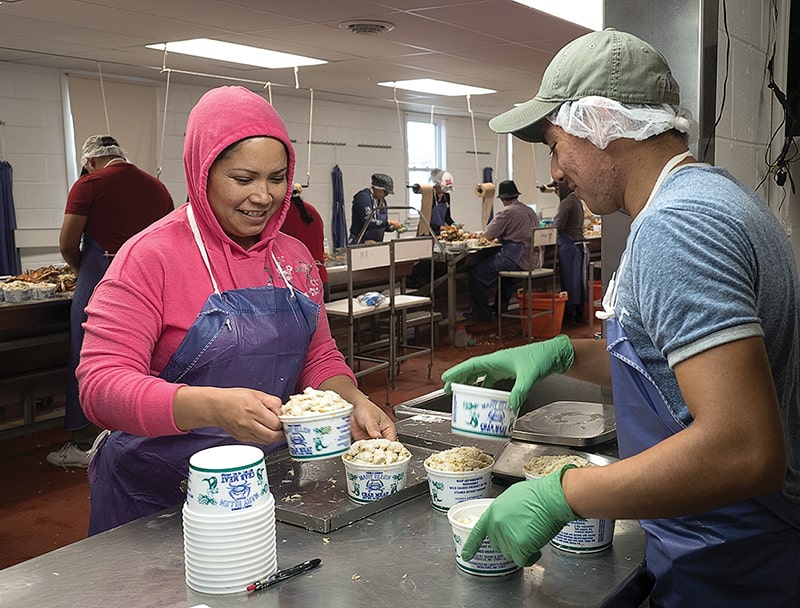By Jeremy Cox, Bay Journal News Service
Maryland and Virginia seafood industry leaders say they won’t have enough workers to process crabs this season unless the federal government once again raises its cap on temporary foreign workers.
Federal immigration officials announced last month that they had doled out the national limit of 33,000 work visas, which are in effect for six months beginning April 1. That was far short of the nearly 100,000 slots that employers had sought to fill.
In Maryland, seafood processors say they received roughly one-third of the 450 visas they need for this season, which also kicks off April 1. The shortage, they warn, could force some of the affected processing plants to close their doors for this season, with the possibility that they might never reopen because their customers and suppliers will have moved on.
Several dozen watermen, crab industry leaders and local elected officials gathered March 2 inside a picking house on Hooper’s Island in rural Dorchester County, MD, to passionately plea for the Trump administration to release 64,000 more visas, the limit set by Congress on how many can be added.
“I hope everyone can see this is more than a job issue, [it’s] more of an American community issue,” said Aubrey Vincent, sales manager at Lindy’s Seafood on Hooper’s Island, home to eight of the state’s 20 crab-picking houses. “A lot of these family businesses are holding on by a thread.”
The temporary visas, known as H-2B visas, are made available annually to workers in seafood, landscaping, construction and other seasonal fields. To be eligible, employers must prove there aren’t enough domestic workers willing or able to fill the positions.
At picking houses, workers scoop meat from freshly caught crabs and collect the chunks into plastic containers to be sold at fish markets, grocery stores and restaurants. The processors often struggle to find enough local employees, especially on Dorchester’s isolated coastline, which is a winding, 40-minute drive to the nearest Walmart and movie theater.
So, the businesses turn to foreign workers, mostly from Mexico. The jobs may be seasonal, but many workers return to the same employers year after year, industry members say.
“I consider these H-2B workers part of my family,” said Darlene Ruark of the W.T. Ruark & Co. picking house. “My son grew up with those workers, and they consider him family, too.”
But for the last 15 years, some picking houses have been left waiting for months to receive their workers or been shut out altogether from the program. So far this year, only three of the county’s nine picking houses have received their workers, businesses say.
In Virginia, Johnny Graham, the fourth-generation owner of the Graham & Rollins seafood plant in Hampton, said he also was shut out of workers. He urged the administration to act quickly. If it waits until June, he will have lost two out of his six profitable months of business, he said.
“We’d might as well shutter,” Graham added.
The region’s seafood industry blames the visa shortage on increasing competition from other business sectors. But above all, they blame Congress for not heeding their repeated calls to set a higher cap or separate seafood workers into a separate visa class.
“Isn’t this a bunch of B.S. that our government is here trying to put us out of business?” asked A.E. Phillips and Sons CEO Steve Phillips. “It’s stupid. It’s something that can be fixed in five minutes.”
The U.S. Department of Homeland Security has temporarily raised the cap by as many as 30,000 workers in recent years to help meet business’ demands. Maryland Gov. Larry Hogan and several members of Congress from Maryland and Virginia are calling on the administration to take that action again.
“Another year of hardship could permanently damage Maryland’s sustainable seafood industry, causing these iconic family and small businesses to close or constrict, which would have a devastating impact on commerce and jobs, particularly in economically disadvantaged areas of the state,” Hogan said.
The Maryland Department of Agriculture released an economic study on the day of the Hooper’s event, showing that the state’s economy would take up to a $150 million hit without the visa workers in the seafood industry.




